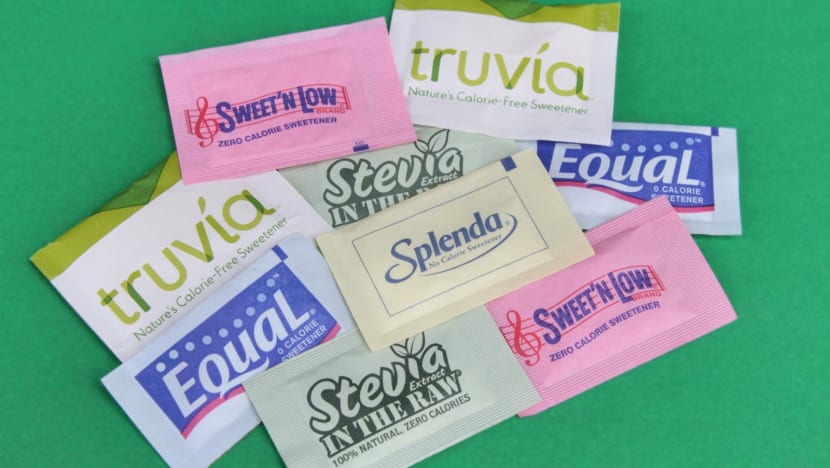CNA Explains: Are sugar substitutes like stevia and saccharin really healthier?
Are you at risk of diabetes or heart disease from consuming non-sugar sweeteners like stevia and saccharin? And how much of these sugar substitutes should you consume?

A woman throws a saccharin pill into a coffee cup. (Photo: iStock)
SINGAPORE: Do you find yourself ordering bubble tea sweetened with stevia, convinced that this sugar substitute is the key to a guilt-free indulgence?
Often marketed as low- or no-calorie alternatives to sugar, artificial sweeteners are largely seen as a way to aid weight loss or maintain a healthy weight.
That may no longer be the case.
The World Health Organization (WHO) has cautioned against the use of non-sugar sweeteners, such as saccharin and stevia, for weight control.
The use of non-sugar sweeteners does not confer any long-term benefit in reducing body fat in adults or children, said the WHO in its recommendation on Monday (May 15).
It also found potential undesirable effects from long-term use of such sweeteners in the form of increased risk of type 2 diabetes, heart disease and mortality in adults.
So, are non-sugar sweeteners really a healthier alternative to sugar? And how much of these sugar substitutes should we consume? CNA finds out.

WHAT ARE NON-SUGAR SWEETENERS?
Non-sugar sweeteners, or sugar substitutes, are chemicals and plant extracts used to sweeten food and beverages.
Common sugar substitutes include acesulfame K, aspartame, advantame, cyclamates, neotame, saccharin, sucralose, stevia and stevia derivatives.
They can be found in ready-to-eat food and drinks, including soft drinks, candy, fruit juice, and ice cream.
Similar to sugar molecules, non-sugar sweeteners have the ability to bind to taste receptors for sweetness. However, unlike sugar, these sweeteners cannot be metabolised by our bodies into calories.
According to the United States Food and Drug Administration (FDA), sugar substitutes are considered "high-intensity" because they are many times sweeter than sugar but contribute only a few to no calories when added to food.
These artificial sweeteners can be classified into non-caloric and sugar alcohols, said Ms Diane Seto, senior dietitian at Mount Elizabeth Hospital. Sugar alcohols contain fewer calories than regular sugar.
There are no other beneficial nutrients like fibre, vitamins, minerals, or antioxidants found in artificial sweeteners, she noted.
"While natural sweeteners may contain trace amounts of antioxidants, vitamins and minerals, these quantities are not enough to make a difference to one’s health, especially in the amounts typically consumed."
WHY USE SUGAR SUBSTITUTES?
Singapore healthcare platform HealthHub said on its website that sweeteners can help with weight management.
"When we replace sugar-sweetened products with those sweetened by sugar substitutes, it reduces energy intake and helps weight loss," it said, citing recent studies.
According to HealthHub, one gram of sugar has four calories while most non-sugar sweeteners have virtually no calories.
"Our sugar consumption should be no more than 10 per cent of our daily energy intake," the website said. "For most adults, that is about 10 teaspoons (50g) of sugar based on a 2,000-daily calorie intake."
The platform also noted that sweeteners "do not cause an increase in sweet cravings or stimulate hunger".
Because artificial sweeteners contain no or few calories, they can be used to replace calorie-containing sugar-sweetened foods and beverages as part of strategies to reduce overall calorie intake, Ms Seto said.
"There is some evidence from short-term trials that suggest the use of artificial sweeteners may lead to reduced sugar intake (approximately 39g per day in one study), as well as lower body weight and lower BMI," she added.
For diabetics, sweeteners that do not contain glucose can help with blood sugar control. They generally do not raise blood sugar levels, according to the FDA.
However, Rachel Cheang, dietitian at Ng Teng Fong General Hospital cautioned against relying heavily on or frequently consuming artificial sweeteners as it may lead to over-consumption.
"The person may think that the food is okay to consume (more) since it’s sugar-free," she said, adding that some of the sugar-free food or drinks may be high in fat, a nutrient which is "often over-looked when the person is too focused on reducing sugar intake".
Excessive fat intake can lead to or promote more weight gain, she noted.
"Rather than turning to artificial sweeteners as quick-fix, one should learn how to control sugar and sweet cravings, and appreciate the natural sweetness of foods or drinks."
Both Ms Cheang and Ms Seto also said that sugar substitutes can aid in dental care, with Ms Cheang noting that they do not cause tooth decay.
"Unlike sugars such as glucose, fructose and sucrose, sugar substitutes like xylitol are not fermented by oral bacteria," Ms Seto said.
"This prevents the bacteria from thriving and helps in the prevention of plaque formation or build-up, which is responsible for tooth decay."
ARE ARTIFICIAL SWEETENERS SAFE?
The FDA has approved six artificial sweeteners as food additives: Acesulfame K, aspartame, advantame, neotame, saccharin, and sucralose. It has also received and not questioned “generally recognised as safe” notices for three types of plant-based sweeteners, including stevia.
Sweeteners in food products are safe for consumption, according to HealthHub.
“Any food containing sweeteners can only be sold if it follows regulatory requirements and is approved by the Singapore Food Agency (SFA),” it said on its website.
“There are no proven health risks to consuming sweeteners when taken in moderate amounts.”
The FDA has set specific limits for the consumption of artificial sweeteners. The limits range from 0.3mg/kg body weight to 50mg/kg per day, depending on the type of sweetener.
For instance, it recommends a limit of 15mg/kg per day for saccharin and 50mg/kg per day for aspartame.
However, HealthHub warned that people with Phenylketonuria (PKU) cannot consume aspartame as it breaks down into phenylalanine – an essential amino acid – upon digestion.
PKU is a rare condition where the body cannot break down phenylalanine, which causes it to build up and become toxic.
POTENTIAL HEALTH RISKS
Several health concerns were highlighted by the recent systematic review published by the World Health Organization on artificial sweeteners, Ms Seto said.
Longer-term observational studies revealed that higher intakes of artificial sweeteners were associated with higher BMI and increased risk of incident obesity, type 2 diabetes, heart disease, all-cause deaths, and bladder cancer (from saccharin), she added.
"There is some evidence that suggests higher consumers of artificial sweeteners tend to have a greater appetite and desire to eat, compared to lower consumers," the dietician said.
A study published in 2020 in the National Library of Medicine found that artificial sweeteners can trigger the release of insulin from the pancreas as they are mistaken for glucose due to their sweet taste. This can increase insulin levels in the blood, potentially contributing to reduced receptor activity and insulin resistance.
The development of resistance to insulin by the body can increase the risk for type 2 diabetes.
Another study published in February this year in the journal Nature Medicine and funded in part by the US National Heart, Lung, and Blood Institute, reported that erythritol, a common type of artificial sweetener, is linked to an increased risk of heart attack and stroke.
The researchers studied more than 4,000 people in the United States and Europe and found those with higher blood erythritol levels were at an elevated risk of experiencing an adverse cardiovascular event such as heart attack, stroke, or death.
Both studies noted that further research is required to conclude a direct correlation between artificial sweeteners and increased risks of diabetes and cardiovascular diseases.
"(It’s) important to understand that the current research on artificial sweeteners is derived from observational studies, which compared higher consumers of artificial sweeteners - who already tend to have poor diet quality and higher disease risk - to those with lower intakes of artificial sweeteners," said Ms Seto.
"Therefore, these studies could have exaggerated the negative association between artificial sweeteners and chronic disease, and must be interpreted with caution in light of other evidence."
The WHO said that its recommendation on non-sugar sweeteners was "conditional", given that the link observed in the evidence between sweeteners and disease outcomes "might be confounded by baseline characteristics of study participants and complicated patterns" of sweetener use.
"The current position from the World Health Organization is that artificial sweeteners should not be used as a means to achieve weight control, erring on the cautious side as they are unable to fully reconcile the discordant findings between the shorter-term trials (which showed benefits) and the longer-term studies (which showed harm)," Ms Seto noted.
Read this story in Bahasa Indonesia here.

















